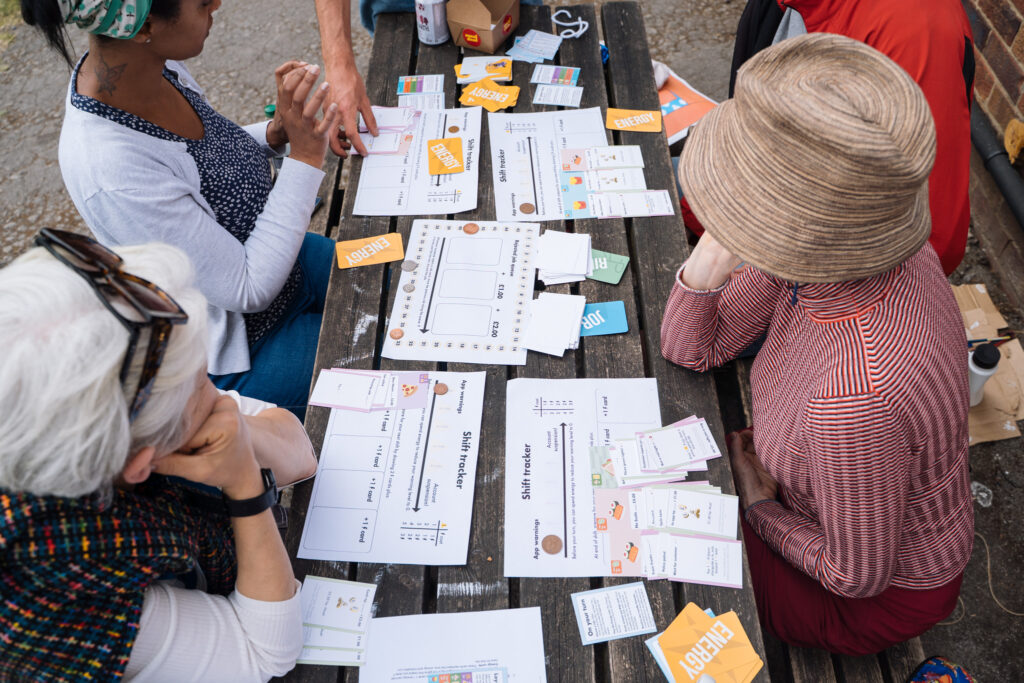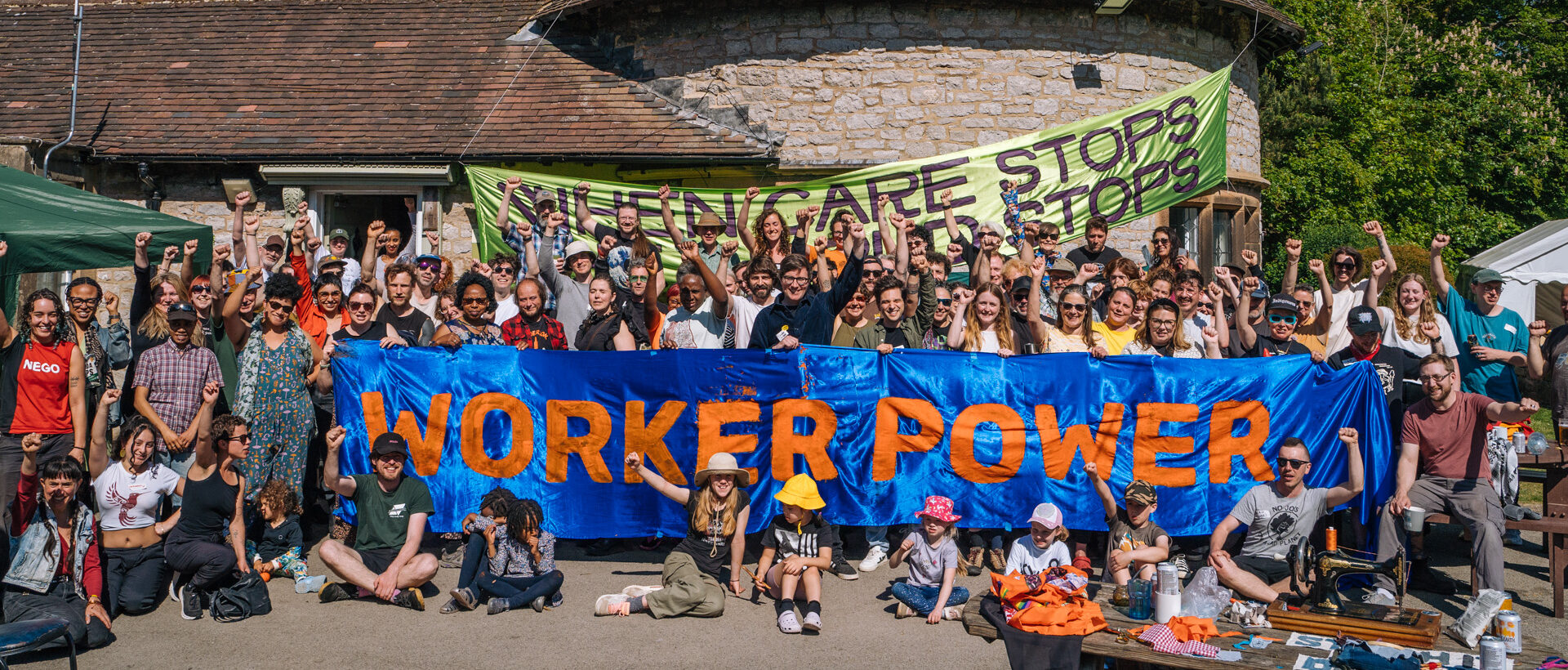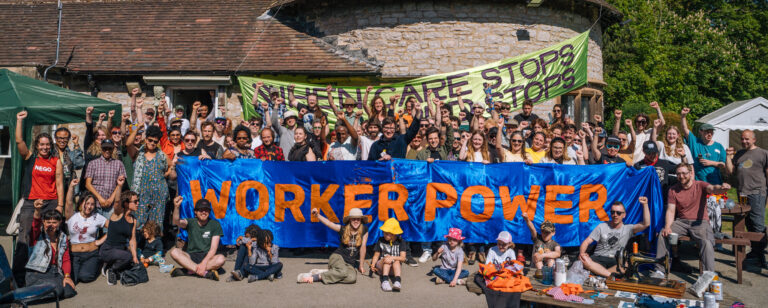This weekend, I was fortunate enough to participate in Worker Co-op Weekend 2025, organised by Workers.Coop – the federation of worker-led cooperatives.
It took place in the beautiful Derbyshire Dales – a visit to which is enough to make anyone feel passionate about people and the world. So with the Dales as the background to a weekend’s worth of learning, you can imagine how good it felt to be there.

What was on the schedule? Skills and learnings.
First up, I have to say that the schedule wouldn’t have been possible at all without the hard work of the Nanny Solidary Network. Their service allowed parents like me to contribute fully whilst our kids had the time of their lives roasting marshmallows, tackling woodland climbing courses, learning to sew and generally being wild outdoors (which is a rare treat these days).
And as for the grown-up programme, there was (of course) lots of talk about strengthening the co-op network. However, the sessions I found most interesting were the practical ones, a few of which I’ll detail here 👇

Givers Gain: Business referrals
This was a taster of a regular networking session led by Siôn Whellens of Principle Six. These are incredibly simple yet effective sessions that differ from traditional networking in that they’re designed to give attendees direct referrals to useful contacts within each other’s networks.
And it really works: most attendees came away with a bunch of promising connections for their business. If you’re not familiar with these events, I strongly recommend finding one and participating. Siôn runs regular sessions online through workers.coop (see their events page) and we also host a programme of in-person sessions in SPACE4.

Mapping cooperatives and spotting opportunities for co-op growth
Another interesting session saw us helping DotCoop (who manage the distribution of the .coop domain) with their Cooperatives World Map. This interactive map aims to “unite and showcase all cooperative entities in the world”. Which is a pretty grand plan.
In addition to discussing how we might improve usability, what was most interesting to me was how this map could be used to visualise the supply chains and flow of services between co-ops.
This appears to offer considerable potential at a strategic level, enabling cooperative bodies (such as Cooperatives UK) to identify potential gaps in the market for new co-ops. In other words, to help identify existing supply chains that don’t contain a cooperative business. This insight could be used to help focus new co-op creation efforts, ensuring that supply chains in various sectors include at least a few cooperative options.
AI and Cooperatives
In an impromptu session led by Paula Mesa Macías, we learnt about common AI use cases, in particular relating to cybersecurity (Paula’s specialism). Plus, we were introduced to Worthwhile AI and Cooperative AI (not quite a cooperatively owned entity, but good to hear about).
Then we moved into a really interesting discussion about whether our cooperatives need to adopt an AI policy, and where to even start on this.
This was quite an emotive (for me) topic, and the start of some positioning on AI and policies about AI. There’s a lot to be said here, so I’ve put it into a separate blog post: Should cooperatives (or any business) have an AI policy?

Finance Skill Share
The last session I want to highlight focused on financial skills, and it also raised some strong feelings about the attitude of some worker-owned cooperative businesses towards profit and surplus.
Some participants in the session expressed frustration at some of the Members of their own coop’s resistance to price increases, and outright rejection of margins. One participant even shared how they’d be accused of being a capitalist for suggesting raising their prices.
I strongly believe that adopting a cost-based pricing strategy – i.e., charging customers only what it costs you to deliver your products or services – is dooming your business to fail. You can’t survive as a business unless you are also: charging so that you can pay for your team and your operating costs during lean times; charging so that you can pay yourselves for doing the admin; charging to cover the business of finding new business; and charging to invest in the skills of your team.
This certainly chimes with what I’ve anecdotally heard from some new tech cooperatives, which start by either charging rates with a very low margin or charging for delivery but not for paying themselves for the work of running their shared business, nor for finding new work and writing proposals.
With service-based co-operatives like tech co-ops, particularly those comprised of developers and designers, finding work becomes a secondary, less favoured activity compared to delivering. This contributes to the pipeline of new work, withering and drying out.
And the personal cost of not charging appropriately? It’s high.
“We are exploiting ourselves, and I’m already on minimum wage”
— a co-op delegate at the Finance Skill Share
But to end on a positive, constructive note, if you’re interested in upskilling your co-op in financial skills, you should look to Acorn Coop. A year or so ago, we were lucky enough to attend an excellent session led by them, in collaboration with Seeds for Change, on Financial Literacy for Cooperatives. It covered everything from:
- Budgets and cash flow
- Accounting terms
- Annual accounts
- Loans and bookkeeping
- Measuring profitability
- VAT, tax and NI
… and lots more.
Look them up!
Interested in attending to improve your co-op skills?
The Worker Coop Weekends are getting better and better, with a richer programme every year. If you want to improve your understanding of co-operatives, to upskill, to build connections and get referrals for your business, then you’d do well to keep an eye on the events listed on the Workers.coop website. The team are already planning the sessions for next year – and maybe I’ll see you there 😉








